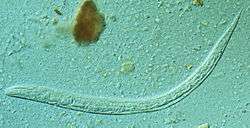Strongyloides
| Threadworm | |
|---|---|
 | |
| First stage larva (L1) of S. stercoralis | |
| Scientific classification | |
| Kingdom: | Animalia |
| Phylum: | Nematoda |
| Class: | Secernentea |
| Order: | Rhabditida |
| Family: | Strongyloididae |
| Genus: | Strongyloides |
| Species | |
| |
Strongyloides (from Greek strongylos, round, + eidos, resemblance), anguillula, or threadworm is a genus of small nematode parasites, belonging to the family Strongyloididae, commonly found in the small intestine of mammals (particularly ruminants), that are characterized by an unusual lifecycle that involves one or several generations of free-living adult worms.
Human infection, strongyloidiasis, is chiefly caused by Strongyloides stercoralis, widespread in all tropical regions, or by Strongyloides fuelleborni, a parasite of primates in African and Asian tropics and of humans in African tropics and New Guinea. Other species include Strongyloides papillosus found in cattle, pigs, sheep, goats, rabbits, and rats, Strongyloides ransomi found in pigs, and Strongyloides ratti, found in rats.